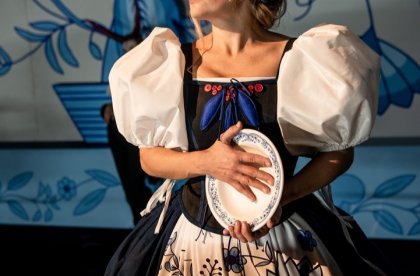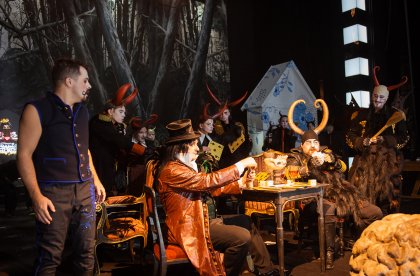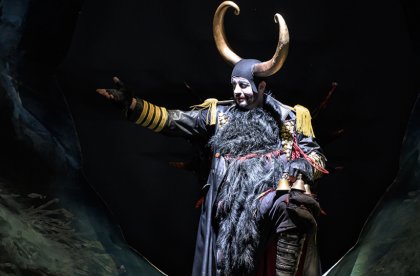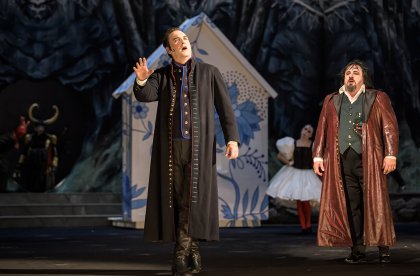Music: Jaromír Weinberger (1896–1967)
Libretto: Max Brod (1884–1968) to an original Czech libretto by Miloš Kareš (1891–1944)
Based on Josef Kajetán Tyl’s play The Strakonice Bagpiper, or The Feast of Wild Women.
“Czechs, Germans, citizens of the world – gather round! See a fairy tale!” That is how the stage director Vladimír Morávek invites audiences to the premiere of Jaromír Weinberger’s opera Schwanda the Bagpiper, to Miloš Kareš’s libretto. And indeed: the opera based on the widely popular tall story, which inspired Josef Kajetán Tyl to write his play The Strakonice Bagpiper, or The Feast of Wild Women, is a fairy tale from head to toe – depicting a simple story, featuring clear-cut characters, either evil or good, and, naturally, with a happy ending. All that supported by music abounding in lovely melodies, masterful fugues, as well a grandiose conclusion, “So the story ends”, with a quotation of the splendid Czech song In That Yard of Ours. In the libretto, Kareš retained the story of Švanda, with magic bagpipes, and his young wife Dorotka, yet he added the character of the bandit Babinský, who secretly longs for Dorotka. Babinský persuades Švanda that village life is dull and coaxes him to leave home and set out on a journey with a view to winning the queen with a heart of ice, who is in the power of a wicked sorcerer.
Jaromír Weinberger was not the first to set the traditional fable of the Strakonice bagpiper. But at the time when Weinberger’s opera Schwanda the Bagpiper premiered precious few remembered the previous setting, Karel Bendl’s 1880 cantata, to Jaroslav Vrchlický’s text, and its opera-ballet remake, first presented in 1907 (after all, the opera-ballet only received three performances). By the time Weinberger completed his opera, the National Theatre in Prague had staged Tyl‘s play The Strakonice Bagpiper, first furnished with music by Mořic Anger and then by Rudolf Zamrzl. Jaroslav Křička’s incidental music came later than Weinberger’s opera.
read more
Weinberger’s Schwanda the Bagpiper premiered on 27 April 1927 at the National Theatre, conducted by Otakar Ostrčil. The reputable Musikblätter des Anbruch wrote that the opera’s success “was assured right after the splendid and extensive prelude. Such torrential flight of the fast fugato, such brilliance of orchestral colours we have not observed for a long time.” Yet notwithstanding complimentary reviews, after 14 performances the opera was, for unknown reasons, withdrawn from the National Theatre repertoire. Its fate changed after Max Brod translated the Czech libretto into German. In 1928 the opera was presented in German at the Municipal Theatre in Wrocław (Breslau) and a year later at the Neues deutsches Theater in Prague. In 1929 Schwanda the Bagpiper was performed in Basel, Ljubljana, Leipzig and Berlin, where it was staged at the Staatsoper Unter den Linden, under the legendary conductor Erich Kleiber and with Theodor Scheidl and Maria Müller cast in the lead roles. Subsequently, the opera was presented in Budapest, Sofia, Helsinki, Vienna and elsewhere. “Weinberger hit the bull’s eye. He created a folksy opera of an exciting variety of colours. Weinberger’s music is capable of engaging all the good spirits of the Czech musical nature, traditional songs and dances, and by the virtuoso hand of an extraordinary connoisseur attire them in a fitting, wonderfully cut musical garb,” a critic wrote in the wake of the opera’s premiere in Vienna. In 1931 Schwanda the Bagpiper was performed at the Metropolitan Opera in New York, and three years later at the Royal Opera House Covent Garden in London. And in 1935 the Strakonice musician even enthralled audiences in Buenos Aires.
The opera Schwanda the Bagpiper garnered acclaim all over the world, and was translated into some 17 languages. The life of Jaromír Weinberger had many twists and turns, but, unlike in fairy tales, did not end happily. Owing to his Jewish descent, in the 1930s his music was banned as “undesirable”, and the composer was forced to leave Czechoslovakia and live in exile. On 8 August 1967, Weinberger committed suicide. He died in St. Petersburg, Florida, where he spent the final years of his life. A life during which he enjoyed great fame, yet also suffered enormous disappointment.
read less
























































